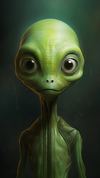Han Solo – The Frontier Spirit in a Galaxy Far, Far Away
Han Solo embodies the frontier spirit, mirroring early American pioneers with his independence, survival instincts, and reluctant heroism. His legacy proves the frontier myth thrives in science fiction.
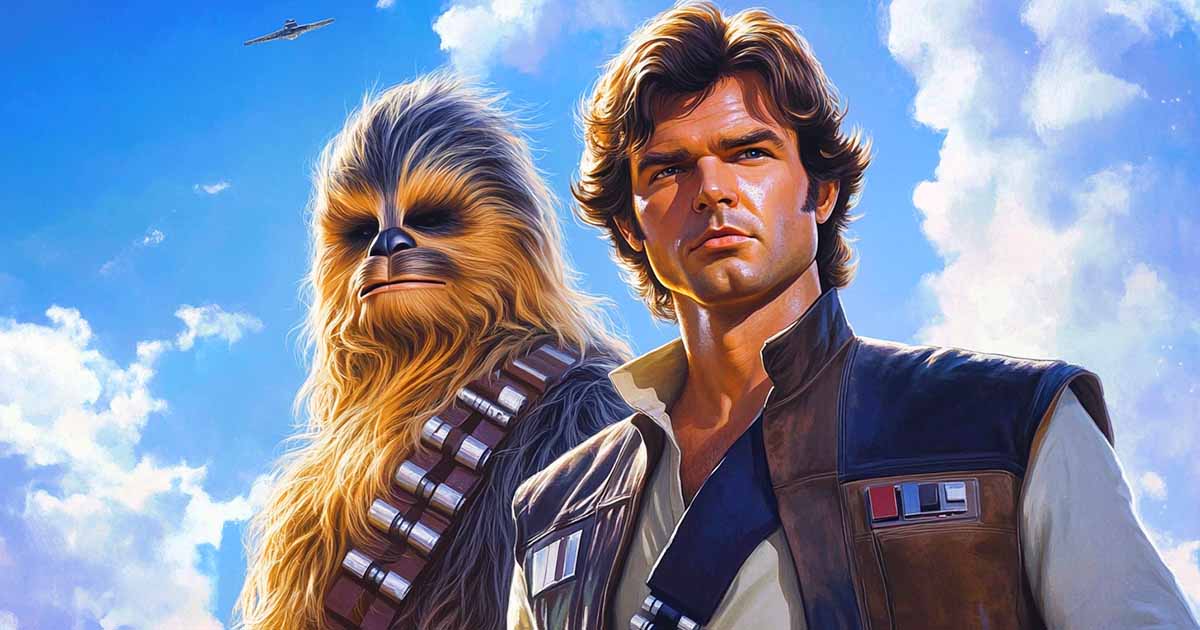
The frontier spirit is woven into the fabric of American identity. From Daniel Boone exploring the Cumberland Gap to the homesteaders carving out a life on the Great Plains, the pioneer is an enduring symbol of self-reliance and survival.
Science fiction has long embraced this mythos, taking it from the untamed wilderness of Earth to the vast unknown of space. Among the many sci-fi figures who embody this spirit, none is more iconic than Han Solo.
When "Star Wars" first hit theaters in 1977, audiences met Solo as a fast-talking smuggler with a blaster on his hip and a price on his head. He was a rogue, an outlaw, a man operating on the edges of civilization—not unlike the fur traders, gunfighters, and outlaws of the American West.
Throughout the trilogy, he transformed from a mercenary motivated by profit to a hero willing to risk everything for a cause greater than himself.
Han Solo's story is more than an adventure in a galaxy far, far away. It is a retelling of an older tale, one that has played out across American history. Like the pioneers of the 18th and 19th centuries, Solo navigates lawless frontiers, lives by his own code, and, in the end, finds something worth fighting for.
In this article, we will explore how Han Solo mirrors the early American pioneers, from his independent nature to his reluctant heroism, proving that the frontier spirit is alive and well—even in hyperspace.
Han Solo as a Space Pioneer
The pioneers of early America ventured into the unknown, carving out a living on the fringes of civilization. They traveled westward, seeking opportunity in a land where the rule of law was often distant and survival depended on wit, skill, and nerve. Han Solo operates in much the same way, making his way through a galaxy where Imperial authority is overbearing, crime syndicates hold power, and danger lurks in every shadowport. He is not a soldier or a noble hero—he is a man making a living in an unforgiving frontier.
Navigating the Wild
Like the covered wagons that carried settlers across the Great Plains, the Millennium Falcon is Solo's means of survival. It is not just a ship—it is a home, transport, and lifeline.
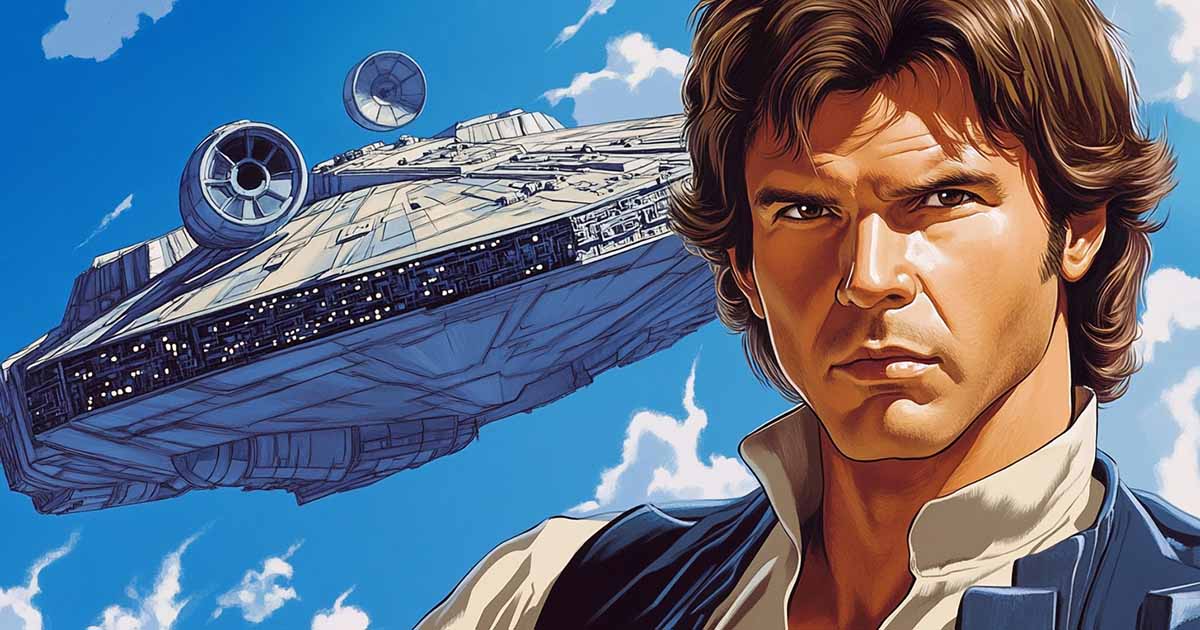
The Falcon allows Han to move between the lawless Outer Rim and the more controlled Core Worlds, much like how traders and scouts moved between the wilderness and established settlements. The galaxy of "Star Wars" is divided between civilization and the untamed expanse beyond it, mirroring the American frontier of the 18th and 19th centuries.
Survival in a Harsh Landscape
Smuggling under Imperial rule is not unlike the actions of frontier settlers who avoided excessive taxation or found ways to trade outside of government control.
Like British colonial rule or later federal mandates, the Empire imposes strict regulations that force independent operators like Han to work in the shadows. But survival requires more than just evading the authorities. Han is a quick thinker, an expert pilot, and a sharpshooter—skills that mirror the adaptability of early American frontiersmen. Whether he's bluffing his way out of a deal gone wrong or navigating an asteroid field to escape a Star Destroyer, his ability to think and act under pressure keeps him alive.
Han Solo is not a noble Jedi or a political leader. He is a survivor in a hostile world, a man who relies on his ship, his skill, and his instincts to get by—just as the pioneers of America once did.
The Smuggler's Code
The American frontier was a land where the rule of law was often secondary to personal codes of conduct. The lawmen were few, the territories vast, and survival depended on a man's ability to hold his own. Han Solo, like many frontiersmen before him, operates outside formal legal structures but still adheres to an internal sense of right and wrong. He may be a smuggler, a rogue, and a gunfighter, but he is not without principles.
Lawless but Principled
Frontier men were not always law-abiding, but many lived by an unspoken code of honor. Han Solo embodies this ideal. He keeps his word—even if it takes him longer than expected. He is loyal to those he trusts, as seen in his lifelong partnership with Chewbacca, who swore a life debt to him. Even in his dealings with crime lords like Jabba the Hutt, Han intends to pay off what he owes, proving that —despite his roguish nature— he values fairness. His sense of honor ultimately leads him to abandon his self-serving ways and fight for something bigger.
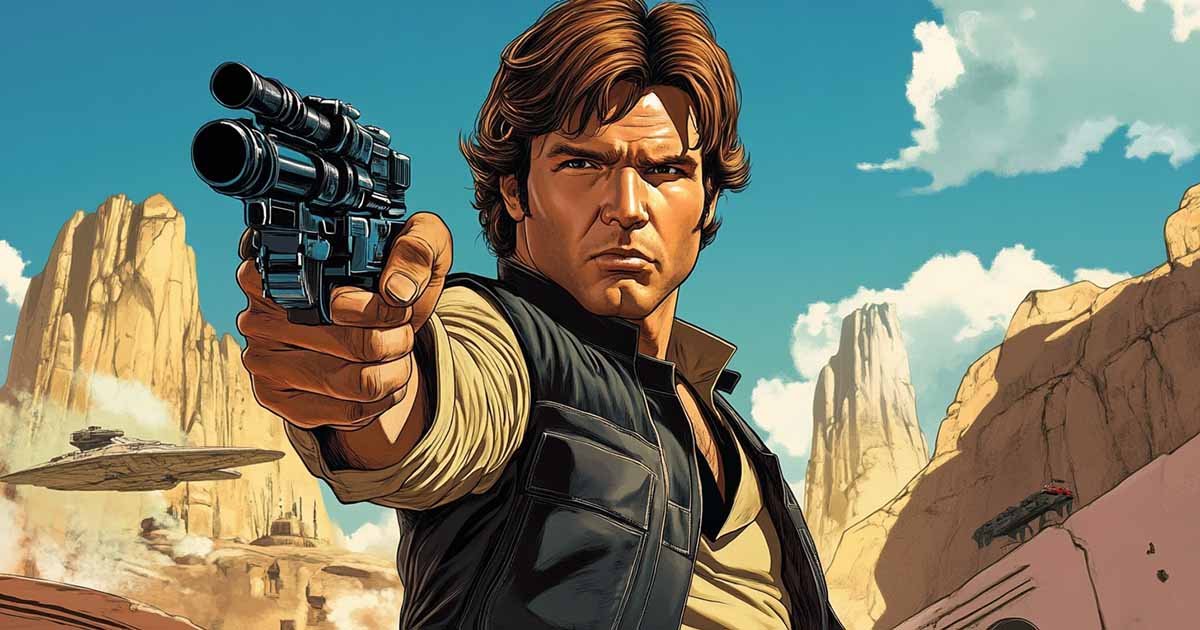
Gunfighters and Duels
The cantina showdown between Han and Greedo is one of the most famous moments in "Star Wars," and it plays out like an Old West duel. In the frontier tradition, the ability to draw first often meant the difference between life and death. Han understands this reality and acts accordingly—he shoots first. It is not an act of villainy but of survival, a lesson well understood by those who lived beyond the reach of law and order.
Trading and Smuggling
Smuggling in "Star Wars" is the sci-fi equivalent of frontier trade. In the 19th century, fur trappers and merchants supplied goods to settlers, outlaws, and Native American tribes alike, often working in defiance of government regulations. Han Solo operates in much the same way, running cargo for clients ranging from Jabba the Hutt to Rebel outposts. While some of his dealings are criminal, his work is essential to the movement of goods in the galaxy's black market economy.
Han Solo may be an outlaw, but he is no common criminal. He is a man who understands the harsh realities of frontier life, living by a code that values loyalty, fairness, and quick thinking. It is the way of the West—whether on Earth or in a galaxy far, far away.
From Fortune-Seeker to Freedom Fighter
Many pioneers did not set out to become heroes. They went west to stake a claim, find fortune, or simply escape the restrictions of civilization. Yet, as history shows, some were drawn into greater conflicts—whether by necessity, loyalty, or a changing sense of purpose. Han Solo follows the same path. He begins as a man motivated by self-interest, but over time, he becomes a leader in the fight for freedom.
Self-Interest First
When audiences first meet Han Solo in "Star Wars," he is not interested in noble causes or rebellion. He is a smuggler looking to get paid. His initial deal with Obi-Wan Kenobi and Luke Skywalker is purely transactional. He makes this clear when he tells Leia, "I'm in it for the money." This practical mindset mirrors many early settlers and traders, who saw the frontier as a means to wealth—whether in land, gold, or commerce.
Han's cynicism is not unfounded. Like many frontiersmen, he has spent years surviving in a dangerous world. Trusting in a cause —or in people— does not come easily. His focus is on paying off debts, staying alive, and avoiding entanglements. But, as with many reluctant heroes, fate has other plans.
The Turning Point
The Battle of Yavin is Han Solo's moment of decision. Having taken his reward for rescuing Leia, he prepares to leave—until he does not. His last-minute return to save Luke Skywalker is a defining moment, mirroring historical figures who were drawn into larger conflicts. Just as some frontiersmen joined militias or fought in wars not because they sought heroism, but because the stakes became personal, Han realizes that running away is no longer an option.
Personal Growth
By "The Empire Strikes Back," Han is no longer a man on the sidelines. He takes responsibility, leading the evacuation of Echo Base and putting himself at risk for others. His relationships, particularly with Leia and Chewbacca, deepen. Like the pioneers who eventually built lasting settlements, Han is no longer just surviving—he is investing in something greater than himself.
His transformation is complete in "Return of the Jedi," where he leads the Endor strike team, taking on the role of a true leader. The man who once cared only for himself now risks everything for the cause. It is the classic arc of the reluctant hero, the man who starts as an outsider but ultimately finds his place in history.
The American Legacy of Han Solo
Han Solo's enduring appeal is no accident. He is a character shaped by the same forces that built American folklore—the lone wanderer, the gunslinger, the reluctant warrior. His story resonates because it mirrors a cultural ideal deeply embedded in the nation's history. Independent, rebellious, but ultimately noble, Han embodies the myth of the self-made man who navigates a dangerous world on his own terms.
Why His Character Resonates
The American frontier created a certain kind of legend, the man who survives not because of privilege or title, but through wit, skill, and sheer determination. Han Solo fits this mold perfectly. He is not a Jedi born with mystical powers. He does not command armies or come from a noble lineage. He is a smuggler with a ship, a blaster, and a knack for getting out of trouble. Yet, like the great American folk heroes—Davy Crockett, Kit Carson, Wyatt Earp—he ultimately stands for something greater than himself.
This is the core of Han's appeal. He starts as an outlaw, living by his own code, uninterested in anyone else's fight. But, like the American frontiersmen who eventually built towns and defended them, he grows into a leader. He does not abandon his independence, but he uses it for something greater. That balance—between freedom and responsibility—is central to the American character and is why Han remains one of science fiction's most beloved figures.
The Frontier Continues
Han Solo's legacy extends far beyond "Star Wars." His character set the standard for the space cowboy, influencing countless science fiction stories that followed. Han Solo's DNA, if you will, can be found in Malcolm Reynolds of "Firefly," a captain with a ship, a crew, and a streak of defiance. It is in Din Djarin of "The Mandalorian," a warrior navigating lawless space while forging his own path.
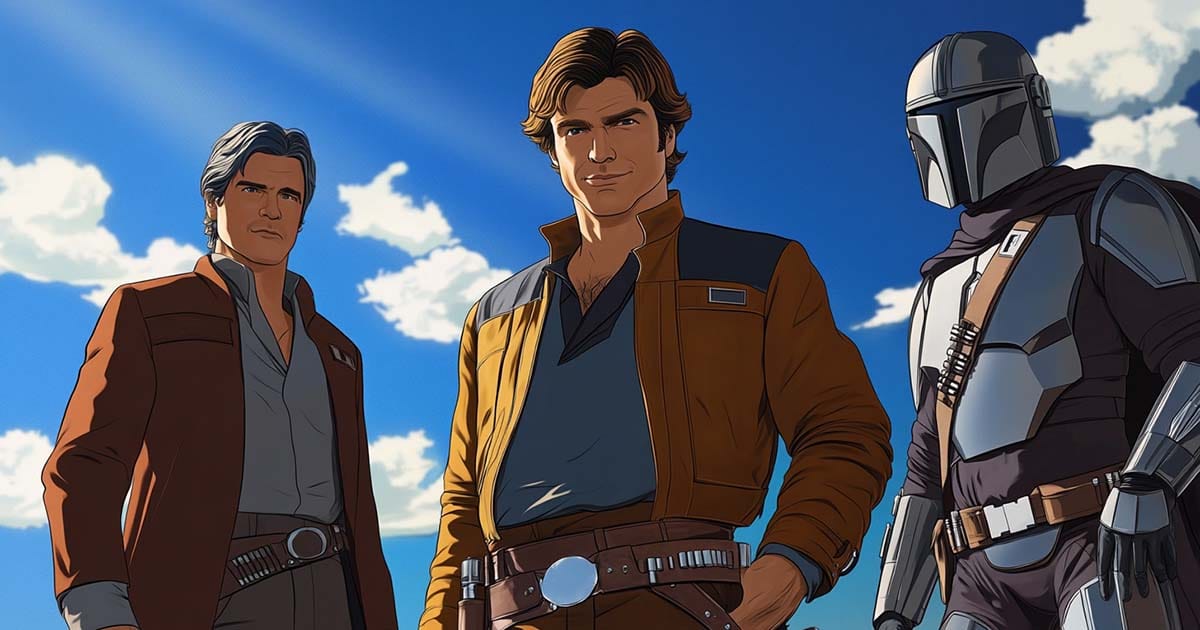
The frontier hero is an enduring myth, whether in the Old West or the stars. Han Solo is its most famous sci-fi incarnation—a rogue, a pilot, a gunslinger, and, ultimately, a man who fights for something bigger than himself. That is why his legacy, like the frontier itself, never truly ends.
The Eternal Frontier of Han Solo
Han Solo is more than a smuggler, more than a rogue with a fast ship. He is the embodiment of the frontier spirit—the self-reliant man who thrives in the wilds of an untamed galaxy. Like the pioneers of early America, he carves out his own path, navigating the dangers of lawless space with skill, courage, and just enough luck to stay ahead of trouble. He does not seek heroism, but it finds him nonetheless.
His arc from fortune-seeker to freedom fighter mirrors the journey of many frontiersmen, who set out in search of wealth but ultimately found themselves part of something greater. Whether he is dodging Imperial blockades, gunning down bounty hunters, or leading a strike team on Endor, Han remains true to the rugged individualism that defines both his character and the American mythos.
As long as audiences love stories of independence, risk, and reluctant heroism, Han Solo will remain one of the most iconic figures in science fiction. His legacy is proof that the frontier—whether in the Old West or a galaxy far, far away—will always call to those bold enough to chart their own course.

